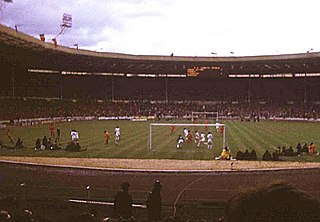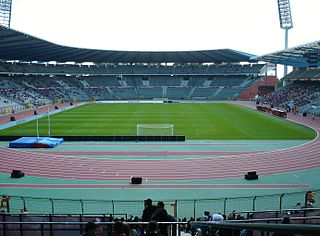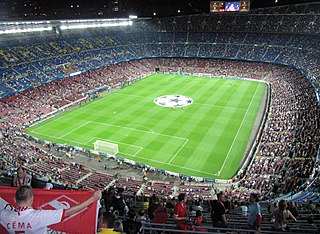Standings
| Rank | Team | Pld | W | D | L | GF | GA | GD | Pts |
|---|---|---|---|---|---|---|---|---|---|
| 1= | 6 | 3 | 2 | 1 | 14 | 7 | +7 | 8 | |
| 1= | 6 | 3 | 2 | 1 | 15 | 8 | +7 | 8 | |
| 3 | 6 | 2 | 4 | 0 | 12 | 7 | +5 | 8 | |
| 4 | 6 | 0 | 0 | 6 | 1 | 20 | −19 | 0 |
Group 1 consisted of four of the 32 teams entered into the European zone: [1] Austria, Hungary, Malta, and Sweden. These four teams competed on a home-and-away basis for one of the 9,5 spots in the final tournament allocated to the European zone, with the group's winner claiming this spot.
| Rank | Team | Pld | W | D | L | GF | GA | GD | Pts |
|---|---|---|---|---|---|---|---|---|---|
| 1= | 6 | 3 | 2 | 1 | 14 | 7 | +7 | 8 | |
| 1= | 6 | 3 | 2 | 1 | 15 | 8 | +7 | 8 | |
| 3 | 6 | 2 | 4 | 0 | 12 | 7 | +5 | 8 | |
| 4 | 6 | 0 | 0 | 6 | 1 | 20 | −19 | 0 |
| Austria | 4–0 | |
|---|---|---|
| Hickersberger Hof |
| Malta | 0–2 | |
|---|---|---|
| Köglberger Spiteri |
Austria and Sweden finished level on points and goal difference, and a play-off on neutral ground was played to decide who would qualify.

The 1966–67 season of the European Cup football club tournament was won by Celtic for the first time in the final against Internazionale, who eliminated defending champions Real Madrid in the quarter-finals, making them the first British team, as well as the first and last Scottish team to date, to win the coveted trophy. The Soviet Union entered its champion for the first time this season.

The 1958–59 European Cup was the fourth season of the European Cup, Europe's premier club football tournament. The competition was won by Real Madrid, who beat Reims 2–0 in the final at Neckarstadion, Stuttgart, on 3 June 1959. This was Real Madrid's fourth European Cup title in a row. The two finalists also competed in the final of the first European Cup in 1956.

The 1959–60 European Cup was the fifth season of the European Cup, Europe's premier club football tournament. The competition was won by Real Madrid, who beat Eintracht Frankfurt 7–3 in the final at Hampden Park, Glasgow, on 18 May 1960. It remains the record score for the European Cup final. It was Real Madrid's fifth consecutive European Cup title, which is a feat that no other club has matched.

The 1961–62 European Cup was the seventh season of the European Cup. The competition was won by Benfica for the second time in a row, beating Real Madrid 5–3 in the final at the Olympisch Stadion in Amsterdam.

The 1962–63 European Cup was the eighth season of the European Cup, a football competition for European clubs. The competition was won by Milan, who beat two-time defending champions Benfica in the final at Wembley Stadium in London. Milan's victory was the first by an Italian club.

The 1965–66 season of the European Cup football club tournament was won by Real Madrid, winners of the first five European Cups from 1956 to 1960, for the sixth time in a close final against Partizan. Real Madrid eliminated title-holders Internazionale in the semi-finals.

The 1967–68 European Cup was the 13th European Cup, UEFA's premier club football tournament. The competition was won by Manchester United, who beat Benfica 4–1 in the final at Wembley Stadium, London. The European Cup title marked the tenth year since the Munich air disaster, in which eight United players were killed and their manager, Matt Busby, was left close to death, the day after earning a place in the semi-finals of the 1957–58 competition. It was also the first time an English side had won the trophy.

The 1969–70 European Cup was the 15th season of the European Cup, a club football tournament organised by UEFA for the domestic league champions of its member associations. It was won by Feyenoord of the Netherlands, who beat Scottish club Celtic after extra time in the final at San Siro in Milan on 6 May 1970. It was the first time the title had been won by a club from the Netherlands, and sparked a period of Dutch dominance in the competition, as Ajax won the next three titles.

The 1970–71 European Cup was the 16th season of the European Cup, UEFA's premier club football tournament. The competition was won by Ajax, who beat Panathinaikos in the final at Wembley Stadium in London, on 2 June 1971. It was the first time the trophy went to Ajax, beginning a three-year period of domination, and the second consecutive championship for the Netherlands. It was also the first time that a Greek team reached the final.
The 1961–62 season of the European Cup Winners' Cup club football tournament was won by Atlético Madrid of Spain in a replayed final against holders Fiorentina. It was the first season of the tournament to be directly organised by UEFA.
The 1963–64 season of the European Cup Winners' Cup club football tournament was won by Sporting CP in a replayed final victory against MTK Budapest.
The 1971–72 season of the European Cup Winners' Cup football club tournament was won by Rangers, who defeated Dynamo Moscow in the final.

The 1980–81 European Cup was the 26th season of the European Cup football club tournament, and was won for a third time by Liverpool, who beat six-time champions Real Madrid in the final. In the 11 seasons up to and including this one, there were only four winners of the European Cup, but there were eleven different runners-up. This sequence was ended the following year, when Bayern Munich lost to first-time finalists Aston Villa.

The 1988–89 European Cup was the 34th season of the European Cup football club tournament. The competition was won by Milan, the first time since 1969 and third time overall, comfortably defeated former winners Steaua București in the final.
The 1982–83 season of the European Cup Winners' Cup was won by Scottish club Aberdeen in an extra-time victory against Real Madrid. Alex Ferguson's young side defeated the Spanish giants after a notable victory over Bayern Munich in the quarter-final. Having conquered the domestic game in Scotland, by defeating the European Cup holders Hamburger SV to win the 1983 European Super Cup, Aberdeen went on to become the only Scottish team to win two European trophies, a record which still stands today. It was the second and last time the title went to Scotland, following Rangers' victory in 1972.
The 1989–90 UEFA Cup was the 19th season of the UEFA Cup, the secondary club football competition organised by the Union of European Football Associations (UEFA). The final was played over two legs at the Stadio Comunale Vittorio Pozzo, Turin, Italy, and at the Stadio Partenio, Avellino, Italy. The competition was won by Juventus, who defeated fellow Italian team Fiorentina by an aggregate result of 3–1 to claim their second UEFA Cup title.

The 1975–76 UEFA Cup was the fifth season of the UEFA Cup, the third-tier club football competition organised by UEFA. The final was played over two legs at Anfield, Liverpool, England and at the Olympiastadion, Bruges, Belgium. It was won by Liverpool of England, who defeated Club Brugge of Belgium by an aggregate result of 4–3 to claim their second UEFA Cup title.
The 1973–74 UEFA Cup was the third season of the UEFA Cup, the third-tier club football competition organised by UEFA. The final was played over two legs at White Hart Lane, London, England, and at De Kuip, Rotterdam, the Netherlands. It was won by Feyenoord of the Netherlands, who defeated Tottenham Hotspur of England by an aggregate result of 4–2 to claim their first UEFA Cup title.
The 1955–60 Central European International Cup was the final edition of the Central European International Cup. It was replaced by the European Nations Championship. Yugoslavia took part for the first time.
Group 4 consisted of five of the 34 teams entered into the European zone: England, Hungary, Norway, Romania, and Switzerland. These five teams competed on a home-and-away basis for two of the 14 spots in the final tournament allocated to the European zone, with the group's winner and runner-up claiming those spots.